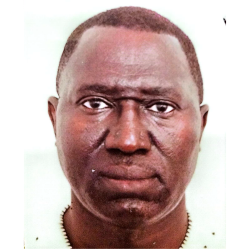Mercury Project Spotlight: Dr. Samba Cor Sarr

In this Mercury Project Spotlight, we feature Dr. Samba Cor Sarr, one of the scientific leads for the Senegal country team. The Mercury Project: Health Ambassadors is a research collaboration between Evidence in Governance and Politics (EGAP), Partnership for African Social and Governance Research (PASGR), and Centre de Recherche et d’Action pour la Paix (CERAP).
The project studies strategies to increase public fluency and confidence in reliable scientific information about COVID-19 and COVID vaccine uptake through a “health ambassadors” outreach initiative. The intervention consists of a “health ambassadors” program in which ambassadors trained on engaging individuals about vaccine risks and benefits will proactively engage households and offer a direct and private opportunity to discuss concerns. The randomized controlled trials will be implemented in four Anglophone and Francophone countries in sub-Saharan Africa—Côte d’Ivoire, Malawi, Senegal, and Zimbabwe. Along with Dr. Sarr, the research team in Senegal includes Mame Mor Anta Syll based at the Université Gaston Berger.
We spoke to Dr. Sarr to learn about his recent studies on the COVID-19 pandemic and a community sponsorship initiative on reproductive health, which consists of women leaders who play a role similar to that of health ambassadors, and how the results from these studies might inform the design of the Mercury Project: Health Ambassadors. Dr. Sarr also shared his inputs on the key characteristics of an effective Covid-19 health ambassador.
What is your current role, and what experiences has your organization had that can contribute to the design of the intervention?
I am the head of the Research Division at the Directorate of Planning, Research and Statistics at the Ministry of Health and Social Action (MSAS) of Senegal. I am also the permanent secretary of the National Ethics Committee for Health Research (CNERS) of Senegal and a member of the National Committee for the Management of Epidemics (CNGE). The research division that I lead has coordinated several studies whose results can contribute to the design of the Mercury Project: Health Ambassadors. Relevant studies include:
- A study on the response capacities of health infrastructures during the COVID-19 pandemic
- A evidence-based study on public policies and practices in response to COVID-19
- An evaluation of the local communication initiative on reproductive health by women community leaders called “Bajanu Gox”
What are some of the important contextual factors to take into consideration in Senegal regarding vaccine hesitancy and encouraging uptake of the COVID-19 vaccine?:
Given the FDA recommendation of the booster vaccine and the low vaccination rates in Senegal and in most African countries, there is an urgent need to conduct a survey on vaccine hesitancy in the context of the declining prevalence of morbidity and mortality related to Covid-19. In the case of Senegal, one of the most important factors to take into account to combat vaccine hesitancy is how risk perceptions regarding COVID-19 vary by socioeconomic status.
Tell us a little bit about the intervention, and why Health Ambassadors may be a promising model for delivering information on vaccination.
In the field of health, it is often not easy to convince the population to adopt preventive measures such as vaccinations. In the context of reproductive health and, in particular, maternal health, Senegal has set up a community sponsorship system called “Bajenu Gox,” which consists of women leaders who play a role similar to that of health ambassadors.
An effective Covid-19 health ambassador must have precise information on the Covid-19 phenomenon in order to convince people to vaccinate. The health ambassador must be familiar with the existing discourse in the community around Covid-19 and vaccination. He/she must engage with the community with detailed information on why community members should change their behavior.
Being an effective ambassador can have a lot to do with behavior. For example, an ambassador who helps fight vaccine hesitancy must also be vaccinated. He must also be empowered on issues related to Covid-19, so that they can change the behavior of the community. If this is done, I believe the desired behavioral change in the community can be achieved.
What are some of the outcomes that you hope the research collaboration will produce?
The project will update knowledge on the explanatory factors of vaccine hesitancy and identify the best “quick win” communication approach to helping improve vaccination rates and promoting the adoption of healthy behavior by individuals and communities. I hope that the project can bridge the gap between differences in scientific and political discourses, as well as public opinion towards reducing vaccine hesitancy.